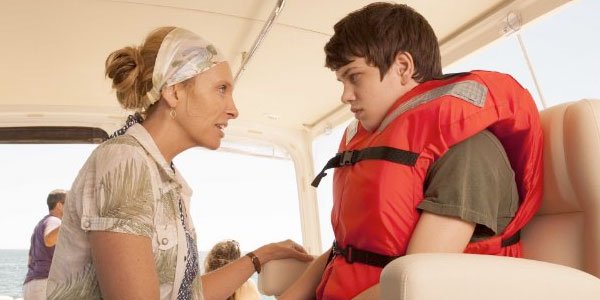Toni Collette Tells Us What Makes The Way, Way Back Stand Out

Back in 2006, an indie dramedy called Little Miss Sunshine lit up the Sundance Film Festival with its quirky family story about a bunch of "losers" who discover their true worth. Co-starring Toni Collette and Steve Carell as sister and brother, the Fox Searchlight film went on to make an astounding $100 million dollars worldwide. Seven years later, and Fox Searchlight is bringing forth another Sundance-selected dramedy starring Collette and Carell that's about finding pride in your freak flag, with Nat Faxon and Jim Rash's The Way, Way Back.
The film tells the story of 14-year-old Duncan, who is stuck on a "family" vacation with his mom Pam (Collette), her smug boyfriend Trent (Carell), and his sneering daughter (Zoe Levin) at Trent's beach house. Duncan flees from forced "family fun" and runs off to a water park each day where he befriends an ever-joking father figure he can actually connect to (Sam Rockwell). The film has long been a passion project for screenwriting partners Faxon and Rash, and after the pair won the Academy Award for Best Adapted Screenplay for The Descendants, they at last had the pull to make it happen on their own terms, making their directorial debut.
With The Way, Way Back making its theatrical debut this Friday, I had a chance to sit down with Toni Collette and discuss what drew her to the film, what was unique about its creation, and what sets this indie charmer apart from its summer competition.
It seems like on paper the role of Pam isn't very showy, what drew you to playing her?
Toni Collette: I think it's the inner conflict. She's kind of yearning—all of the characters are—they are all yearning for some kind of change and unsure how to implement that change. And I think Pam has this kind of fantasy life that she's moving towards and trying to include a father figure for Duncan. And she's clearly chosen the wrong person (in Trent) and it's slowly dawning on her that that's the case. But she's more than willing to ignore it. I think that's really uncomfortable and really challenging to know that you need to make a change, and you're too scared to do it. I guess that's what I loved, the fact that she's so conflicted. And in a way, you almost feel like she's going to ignore it, and try to make this sacrifice for Duncan, who can't stand the man anyway. And I loved that. There's just this notion that adults knowing everything, and kids know nothing, and we have to teach them everything. But Duncan is just so perceptive and I love that he kind of reveals Trent's true nature to his mother. His change inspires her change.
This film is very much about the time in a kid's life where they begin to see their parents are not just our parents, but they are people and they are flawed. When playing this mother, who loves her son deeply but does have this flaw of wanting to have this blind spot, was there something in particular you wanted to make sure audiences got about her?
Well, I hope it's really clear that she has immeasurable love for Duncan. And you know this sort of flight of fancy, out of balance experience, being at Trent's house, you know it's his house, his friends, his rules, his world, and they are trying to tip toe around it trying to be…
CINEMABLEND NEWSLETTER
Your Daily Blend of Entertainment News
This puzzle piece that fits.
Yeah!
I've heard that before you got the role, you wrote Nat and Jim a letter about how you saw Pam's character. Can you tell us a bit of what was in the letter?
It's funny because I read this script years ago and then one day it just kind of popped into my head again, like, 'I wonder what happened to that project?' I didn’t know if it was made and I just didn't see it or if it was still just hanging around. And when I asked my agent, and he was like, "This is weird, because guess what? It's coming up again." I guess the guys had that great fortune—and deservedly so—of winning that Oscar (for The Descendants) which allowed to go to kind of take the helm and direct their own piece of material. So I re-read the latest draft. I suppose being engaged in a movie, tt's not that difficult, I either get it—really get it—or I don't. And (The Way, Way Back) was just so well-written and it just felt so clear to me. I can't remember what was in the letter but it was just as sincere and open as possible. And I just hoped that our visions would align and they would just realize, "Yes! I must play Pam!" And they did! So it was wonderful.
This movie is being compared a lot to Little Miss Sunshine. Which I mean, there are some obvious similarities—
Steve and me!
Yeah, but what do you see is in common in the two films?
It's only now in retrospect—I've been making films since I was 17, and I'm now 40—and I think I tend to gravitate to similar themes all the time. One is about acceptance; there's no such thing as normal, that family is something you may be born into or you may create yourself. And one big similarity between the two—apart from me and Steve being in both—is just this very real high that you're left with.
This is a gorgeous story about someone who is just so uncomfortable in his own skin, meeting someone, and learning from them, and that relationship instilling some confidence in him, and his own positivity then kind of rubs off on the world around him. And going on that journey is—you know people talk about feel-good movies but it really feels fucking good! I saw it four times! I never watch a movie I'm in four times! It was like, "We can book a restaurant for you, you don't have to sit through it again," and I'm like, "Uh, actually no. I actually want to watch it again!" And it's because it's just beautiful. Both of them, both Little Miss Sunshine and (The Way, Way Back) have massive hearts and a real truth to them as well as being absolutely hysterical and very moving. And for me, that's like a perfect movie.

So, you guys shot on location in a real town. I heard the locals would gather around and watch you all and applaud. Jim Rash has said it was kind of like doing "theater in the round," how did that impact you guys working?
I forgot about that! It's true. Outside the house, which was Trent's Riptide, if we were shooting toward the house, pretty much everyone from the area would come (and watch). There was a field across the road and a little low wall, and everyone would just come sit on the wall. Day or night, there would be a little crowd. And the community was so welcoming, and the town itself was so endearing and more than leant what was necessary to the story. Sometimes it can feel off-putting to feel like you're being observed (while you perform) because that in turn can make you observe yourself when you're trying to be just present and free in the moment. But it never felt weird. It never felt weird. I mean, once or twice we maybe had a chuckle about it. But it was just such a lovely experience. It really was. We all lived on this one stretch on the beach.
I heard you got to bring your family too.
Yeah, yeah, my kids. And they were at the beach every day playing with other peoples' kids. We kind of just blended into the community. It was just a very positive energy to it.
I think that reads in the film.
Yeah, I think it comes through. You can feel it.
What do you think sets The Way, Way Back apart from its summer competition?
(Chuckles) Probably about $196 million dollars. (We both laugh hard.) Um…there's a lot of things that will set it apart. It's a great story and there are releatable characters. It will make you belly laugh. It'll move you to tears. I don't think that you'll get that (from the rest).
The Way, Way Back opens July 5th.
Staff writer at CinemaBlend.
Most Popular






